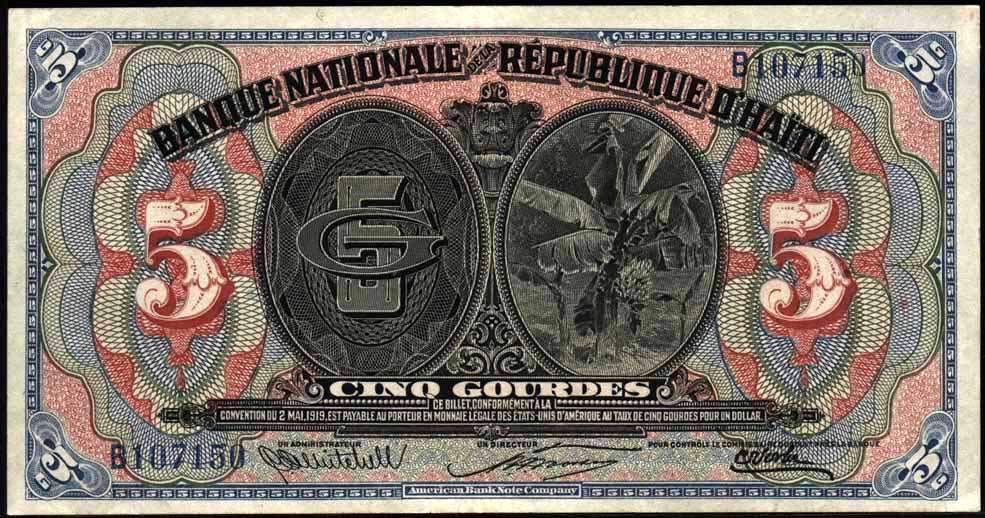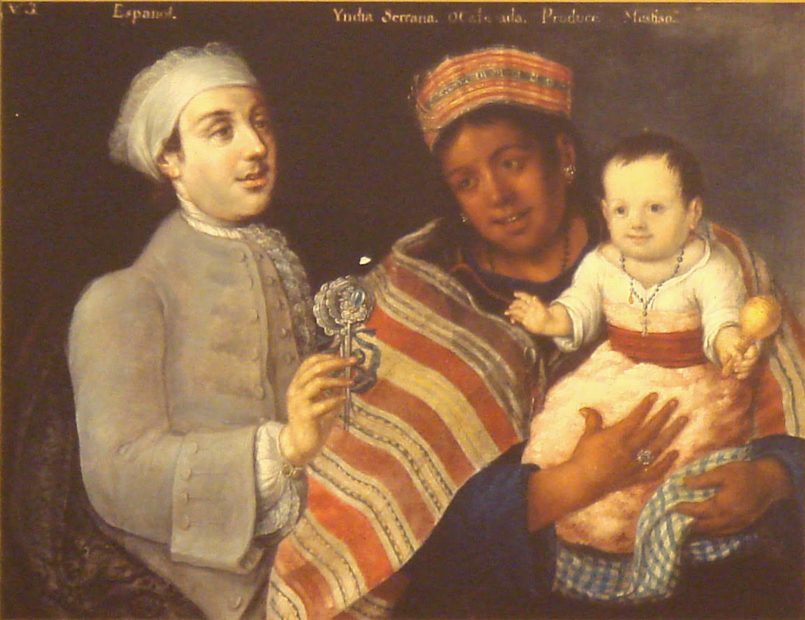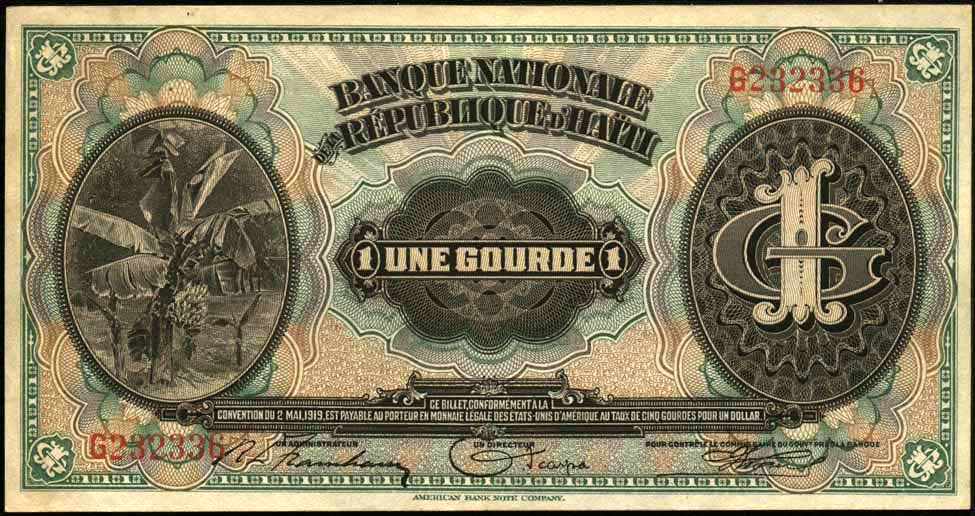1500
Before the Haitian independence of 1804, brutal slavery went on for 300 years. During slavery the only institutions and infrastructure in Haiti were in function of plantation commerce and colonials’ habitat.
When comparing Haiti to the DR, one difference is the formation of social fabric. Spaniards systematically raped women and killed man in most of the Spanish colonies, genocide and ethnocide were deliberate. In the DR, like other Spanish colonies, is found widespread out-breeding, complex hierarchical racial systems, and more invested settlements, also arising from claims of citizenship by the offspring, ultimately in the DR, Spaniards descendant and mestizos asked independence from Spain, to avoid taxes, also at the cost of giving up Spanish citizenship claims, but retained ownership of land, plantations and active and privileged commerce routes.
Most of the world refused to recognize the sovereignty of Haiti and refused to recognize diplomatically the Republic of Haiti, the issue was resolved with very high fines imposed by the French monarchy. The lack of diplomatic recognition impeded furthermore international trade.
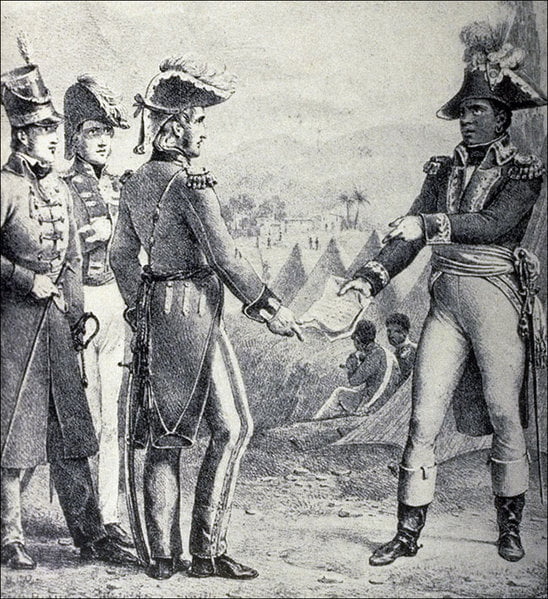
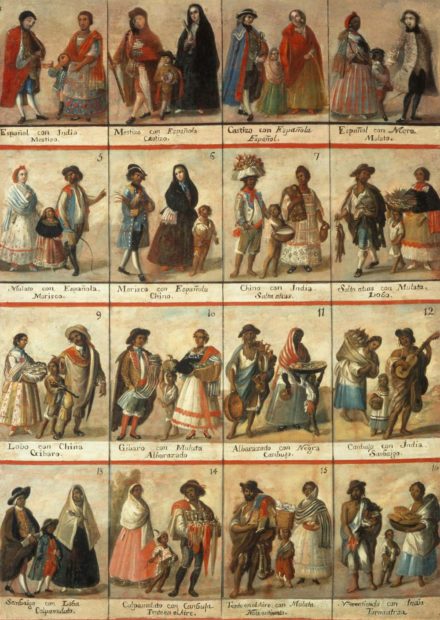
1800
Spaniard descendant are still the dominant political and economical class in most Spanish colonies.
The development of social fabric in French colonies, before and after independence, was affected by different policies and different systems of exploitation, investment and divestment.
After 1804, Haiti was commercially and politically isolated. After Napoleon, the French monarchy re-attempted to re-colonize Haiti. After the revolution, Haiti became a supporter of independence movements, and a supporter of the abolition of slavery in north, central and south America. Ideologically, Haiti was an enemy of all the colonial powers of the time.
The American economy was fueled by slavery. The French, Spaniards and British were all enemies combatant against Haitian independence. The imperialist and the colonial powers wanted to restrain the Haitian wave of freedom and emancipation in the Caribbean, north, central and south America.
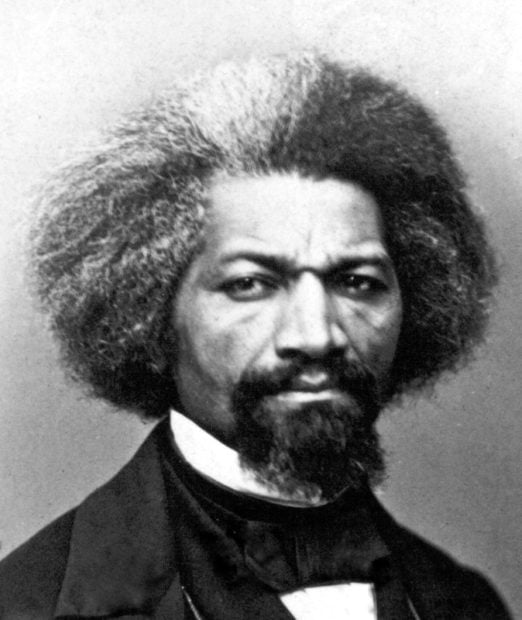
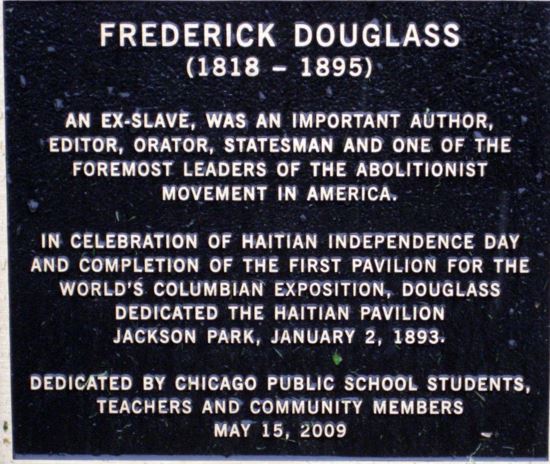
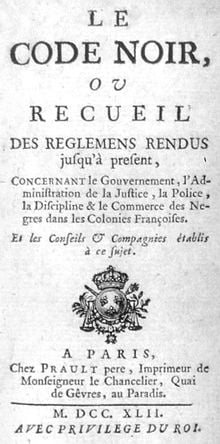
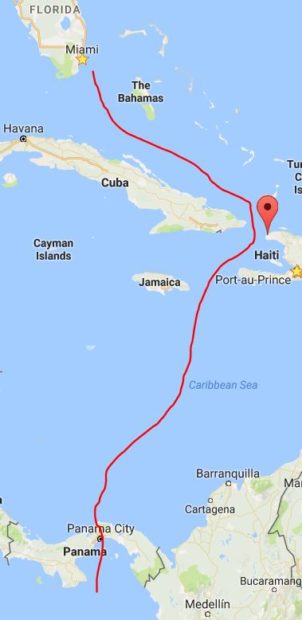
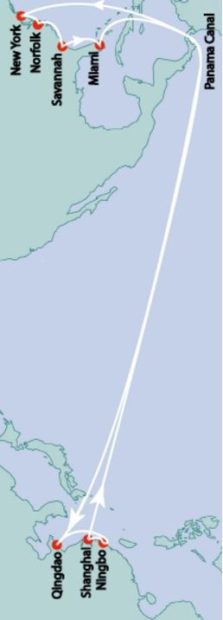
Frederick Douglass lecture on Haiti (1893)
...But a deeper reason for coolness between the countries is this: Haiti is black, and we have not yet forgiven Haiti for being black [applause] or forgiven the Almighty for making her black. [Applause.] In this enlightened act of repentance and forgiveness, our boasted civilization is far behind all other nations. [Applause.] In every other country on the globe a citizen of Haiti is sure of civil treatment. [Applause.] In every other nation his manhood is recognized and respected. [Applause.] Wherever any man can go, he can go. [Applause.] He is not repulsed, excluded or insulted because of his color. [Applause.] All places of amusement and instruction are open to him. [Applause.] Vastly different is the case with him when he ventures within the border of the United States...
...One of these bays has attracted the eyes of American statesmanship. The Mole St. Nicolas of which we have heard much and may hear much more, is a splendid harbor. It is properly styled the Gibraltar of that country. It commands the Windward Passage, the natural gateway of the commerce both of the new and old world. Important now, our statesmanship sees that it will be still more important when the Nicaragua Canal shall be completed. Hence we want this harbor for a naval station. It is seen that the nation that can get it and hold it will be master of the land and sea in its neighborhood. Some rash things have been said by Americans about getting possession of this harbor. [Applause.] We are to have it peaceably, if we can, forcibly, if we must. I hardly think we shall get it by either process, [Applause.] for the reason that Haiti will not surrender peacefully, and it would cost altogether too much to wrest it from her by force. [Applause.]...
...I thought in my simplicity when Minister and Consul General to Haiti, that she might as an act of comity, make this concession to the United States, but I soon found that the judgment of the American Minister was not the judgment of Haiti. Until I made the effort to obtain it I did not know the strength and vigor of the sentiment by which it would be withheld. [Applause.] Haiti has no repugnance to losing control over a single inch of her territory. [Applause.] No statesman in Haiti would dare to disregard this sentiment. It could not be done by any government without costing the country revolution and bloodshed. [Applause.]
I did not believe that President Harrison wished me to press the matter to any such issue. [Applause.] On the contrary, I believe as a friend to the colored race he desired peace in that country. [Applause.]
The attempt to create an angry feeling in the United States against Haiti because she thought proper to refuse us the Mole St. Nicolas, is neither reasonable nor credible. There was no insult or broken faith in the case. Haiti has the same right to refuse that we had to ask, and there was insult neither in the asking nor in the refusal. [Applause.]...
... The common people of Haiti are peaceful enough. They have no taste for revolutions. The fault is not with the ignorant many, but with the educated and ambitious few. Too proud to work, and not disposed to go into commerce, they make politics a business of their country. Governed neither by love nor mercy for their country, they care not into what depths she may be plunged. No president, however virtuous, wise and patriotic, ever suits them when they themselves happen to be out of power.
I wish I could say that these are the only conspirators against the peace of Haiti, but I cannot. They have allies in the United States. Recent developments have shown that even a former United States Minister, resident and Consul General to that country has considered against the present government of Haiti. It so happens that we have men in this country who, to accomplish their personal and selfish ends, will fan the flame of passion between the factions in Haiti and will otherwise assist in setting revolutions afoot. To their shame be it spoken, men in high American quarters have boasted to me of their ability to start a revolution in Haiti at pleasure. They have only to raise sufficient money, they say, with which to arm and otherwise equip the malcontents, of either faction, to effect their object. Men who have old munitions of war or old ships to sell; ships that will go down in the first storm have an interest in stirring up strife in Haiti. It gives them a market for their worthless wares. Others of a speculative turn of mind and who have money to lend at high rates of interest are glad to conspire with revolutionary chiefs of either faction, to enable them to start a bloody insurrection. To them, the welfare of Haiti is nothing; the shedding of human blood is nothing; the success of free institutions is nothing, and the ruin of neighboring country is nothing. They are sharks, pirates, and Shylocks, greedy for money, no matter at what cost of life and misery to mankind...
... From the beginning of our century until now, Haiti and its inhabitants under one aspect or another, have, for various reasons, been very much in the thoughts of the American people. While slavery existed amongst us, her example was a sharp thorn in our side and a source of alarm and terror. She came into the sisterhood of nations through blood. She was described at the time of her advent, as a very hell of horrors. Her very name was pronounced with a shudder. She was a startling and frightful surprise and a threat to all slaveholders throughout the world, and the slaveholding world has had its questioning eye upon her career ever since.
By reason of recent events and abolition of slavery, the enfranchisement of the negro in our country, and the probable completion of the Nicaragua canal, Haiti has under another aspect, become, of late, interesting to American statesmen. More thought, more ink, and paper have been devoted to her than to all the other West India Islands [[[Caribbean]]] put together. This interest is both political and commercial, for Haiti is increasingly important in both respects. But aside from politics and aside from commerce, there is, perhaps, no equal number of people anywhere on the globe, in whose history, character and destiny there is more to awaken sentiment, thought and inquiry, than is found in the history of her people.
The country itself, apart from its people, has special attractions. First things have ever had a peculiar and romantic interest, simply because they are first things. In this, Haiti is fortunate. She has in many things been first. She has been made the theater of great events. She was the first of all the cis-Atlantic world, upon which the firm foot of the progressive, aggressive and all-conquering white man was permanently set. Her grand old tropical forests, fields and mountains, were among the first of the New World to have their silence broken by trans-Atlantic song and speech. She was the first to be invaded by the Christian religion and to witness its forms and ordinances. She was the first to see a Christian church and to behold the cross of Christ. She was also the first to witness the bitter agonies of the negro bending under the blood-stained lash of Christian slaveholders. Happily too, for her, she was the first of the New World in which the black man asserted his right to be free and was brave enough to fight for his freedom and fortunate enough to gain it.
In thinking of Haiti, a painful, perplexing and contradictory fact meets us at the outset. It is: that negro slavery was brought to the New World by the same people from whom Haiti received her religion and her civilization. No people have ever shown greater religious zeal or have given more attention to the ordinances of the Christian church than have the Spaniards, yet no people were ever guilty of more injustice and blood-chilling cruelty to their fellow men than these same religious Spaniards. Men more learned in the theory of religion than I am, may be able to explain and reconcile these two facts; but to my, they seem to prove that men may be very pious, and yet very pitiless; very religious and yet practice the foulest crimes. These Spanish Christians found in Haiti a million of harmless men and women, and in less than sixty years they had murdered nearly all of them. With religion on their lips, the tiger in their hearts and the slave whip in their hands, they lashed these innocent natives to toil, death and extinction. When these pious souls had destroyed the natives, they opened the slave trade with Africa as a merciful device. Such, at least, is the testimony of history...
...Of my regard and friendship for Haiti, I have already spoken. I have, too, already spoken somewhat of her faults, as well, for they are many and grievous. I shall, however, show before I get through, that, with all her faults, you and I and all of us have reason to respect Haiti for her services to the cause of liberty and human equality throughout the world, and for the noble qualities she exhibited in all the trying conditions of her early history...
...In just vindication of Haiti, I can go one step further. I can speak of her, not only words of admiration, but words of gratitude as well. She has grandly served the cause of universal human liberty. We should not forget that the freedom you and I enjoy to-day; that the freedom that eight hundred thousand colored people enjoy in the British West Indies; the freedom that has come to the colored race the world over, is largely due to the brave stand taken by the black sons, of Haiti ninety years ago. When they struck for freedom, they built better than they knew. Their swords were not drawn and could not be drawn simply for themselves alone. They were linked and interlinked with their race and striking for their freedom, they struck for the freedom of every black man in the world. [Prolonged applause.]
It is said of ancient nations, that each had its special mission in the world and that each taught the world some important lesson. The Jews taught the world a religion, a sublime conception of the Deity. The Greeks taught the world philosophy and beauty. The Romans taught the world jurisprudence. England is foremost among the modern nations in commerce and manufactures. Germany has taught the world to think, while the American Republic is giving the world an example of a Government by the people, of the people and for the people. [Applause.] Among these large bodies, the little community of Haiti, anchored in the Caribbean Sea, has had her mission in the world, and a mission which the world had much need to learn. She has taught the world the danger of slavery and the value of liberty. In this respect, she has been the greatest of all our modern teachers.
Speaking for the Negro, I can say, we owe much to Walker for his appeal; to John Brown [applause] for the blow struck at Harper's Ferry, to Lundy and Garrison for their advocacy [applause], We owe much especially to Thomas Clarkson, [applause], to William Wilberforce, to Thomas Fowell Buxton, and to the anti-slavery societies at home and abroad; but we owe incomparably more to Haiti than to them all. [Prolonged applause.]...
Isolation led to a rapid drop in commerce and consequently a rapid drop in agricultural production.
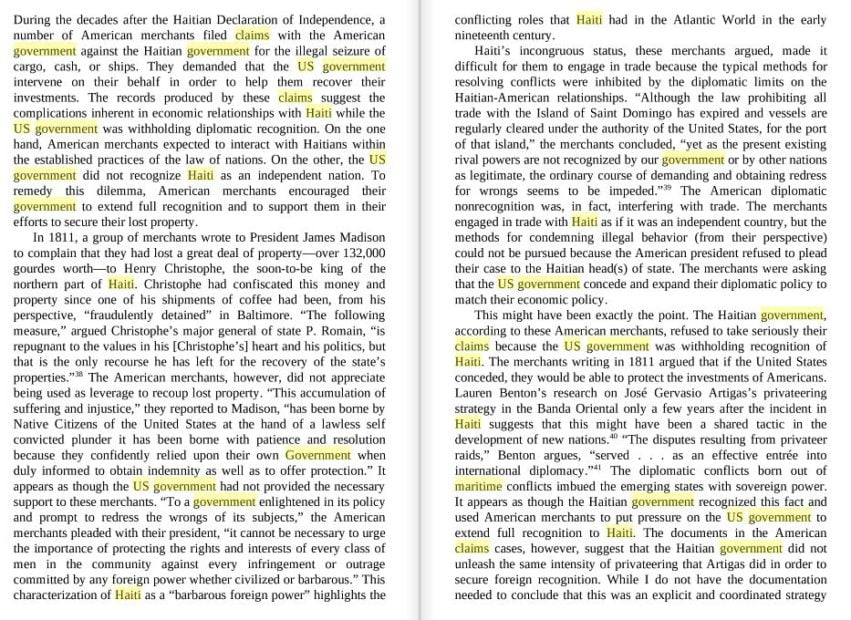
The aspirations to re-colonize Haiti continued, the Southerns during and after the American civil war considered relocating plantations and slavery operations to central America and to Haiti via the DR.
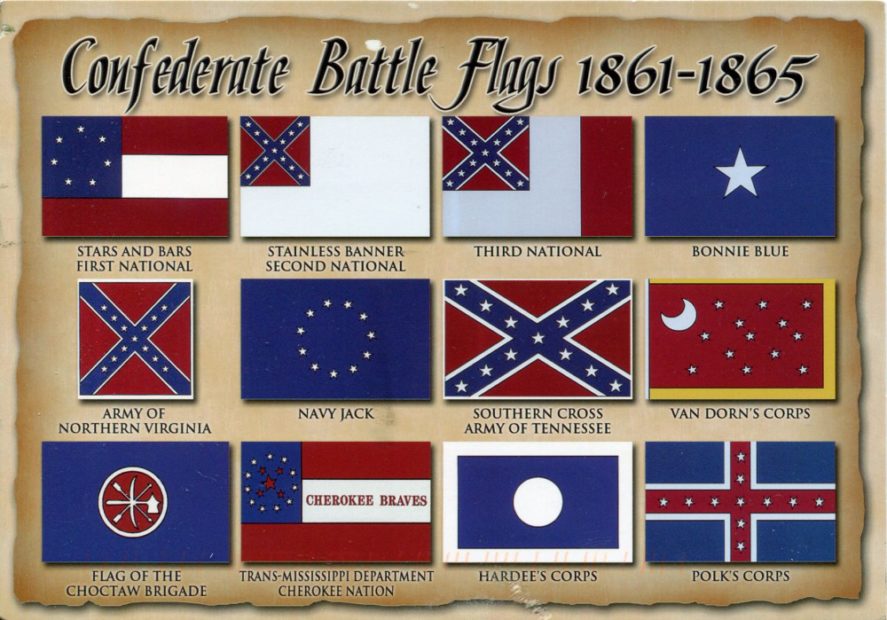
President James Monroe in 1823 “State Of The Union”, “The Monroe Doctrine”, a foreign policy advocating for U.S. dominance in the Americas
The US government has extensively documented national security interests in the control of maritime rights in the north of Haiti.
In essence, the foreign relations and trade relations with Haiti have always been predicated upon overcoming political adversaries seeking to take control of Haiti.
In 1915 the United States occupied Haiti under the premise of national security to prevent the raising of German influence in the area considered under American dominance as stated by the American president James Monroe in 1823 "State Of The Union", “The Monroe Doctrine”, a foreign policy advocating for U.S. dominance in the Americas, and considering any new influence by the Europeans in the continent as an act of aggression.
Hawaii was annexed to the United States under the Monroe Doctrine.
In 1870 President Grant attempted to annex to the United States the DR under the Monroe Doctrine.
In 1898, under the Monroe Doctrine, the US intervened in support of the Cuban War For Independence from Spain. Under the terms of the peace treaty, Spain in exchange for $20M ceded the Philippines, Guam and Puerto Rico, and Cuba was excluded but came under the control of the US until formal independence and after, via puppet dictatorship.
American occupation of Haiti
The 1915 American occupation of Haiti seized all the Haitian government treasury, customs houses and the central bank system under the excuse to protect American loans and French debts.
During the 19 years of occupation, 40% of the Haitian national income was used to pay American and French banks freezing practically Haitian economic development.
Among other things under American occupation the constitution was changed by referendum to allow foreign ownership of land, prohibited by early leader Jean-Jacques Dessalines.
The control of Haitian finances by the US continued until 1947.
National City Bank Of New York
Before the occupation the current Citigroup Bank, then called National City Bank Of New York, competed against Banque de L’Union Parisienne for the control and management of the Banque Nationale D’Haiti, servicing under contract the finances, national debt and fiscal operations of the Haitian Government.
The chairman of National City was Roger Leslie Farnham, a previous lobbyist, in 1914 wrote to the US secretary of state William Jennings Bryan arguing for military intervention as a way to protect American interests in Haiti.
Farnham’s plan
The DOS started communications to the ambassadors and consul in Haiti expressing the desire to implement the “Farnham’s plan”. After the start of the first world war, the French bank withdraw from Haiti, giving National City the opportunity to acquire more equity in the Banque Nationale D’ Haiti.
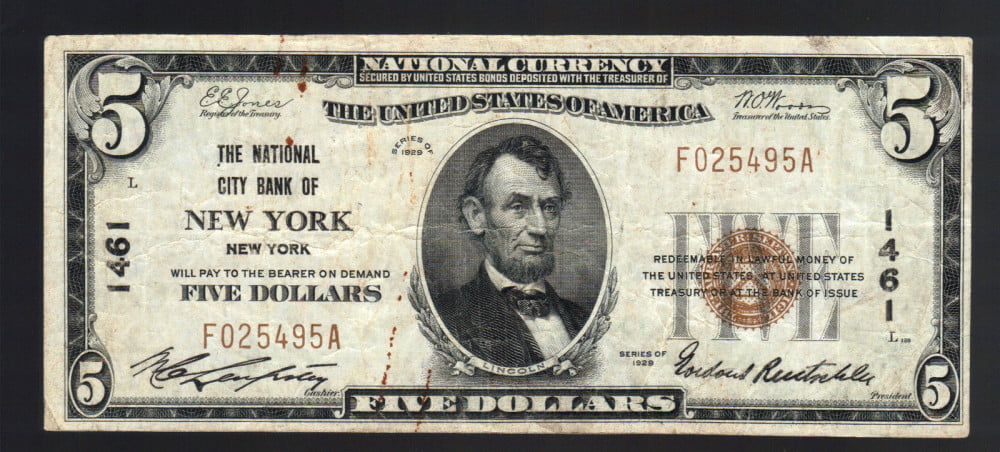
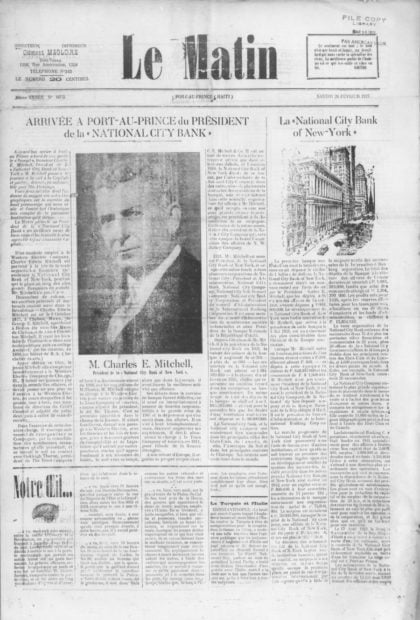
Haitian Republic Gold Reserves to 55 Wall St.
Farnham and National City worked to destabilize the Haitian government. In 1915 the Banque Nationale D’Haiti under the control of National City / Farnham refused to pay government salaries and transferred the Haitian Republic Gold Reserves to 55 Wall St.
The gold was transported by U.S. Marines aboard the USS Machias from Port Au Prince to New York. Under the American occupation, National City had complete control of Banque Nationale D’Haiti until 1935 shortly after the end of the occupation in 1934.
During and after the occupation, the Haitian government was administered by members of the middle class “mulatto” elite supporting the ties to the United States and implementing policies of intimidations and executions against political opposition. The rising of right-wing dictatorships supported by the Americans with financial Aid and paramilitary training, Tonton Macoute, FRAPH 1991, etc… contraposing the communist Cuban Revolution led to repression, extortion, political murder, expulsion, suppression, and imprisonment of opposition.
The historical ties to Venezuela, the proximity to Cuba’s Fidel Castro, the resentment against the Americans have maintained a state of interest by the US to control the sovereignty of Haiti and prevent ideological opposition. The foreign policies of the US have undermined economic development (see Clinton foreign assistance), sovereignty (See FRAPH) and a strong public education system by advocating to maintain a subsidized privatized system. The evolution of the political theories, ideologies, and trade opportunities of Haiti have a very specific history.
